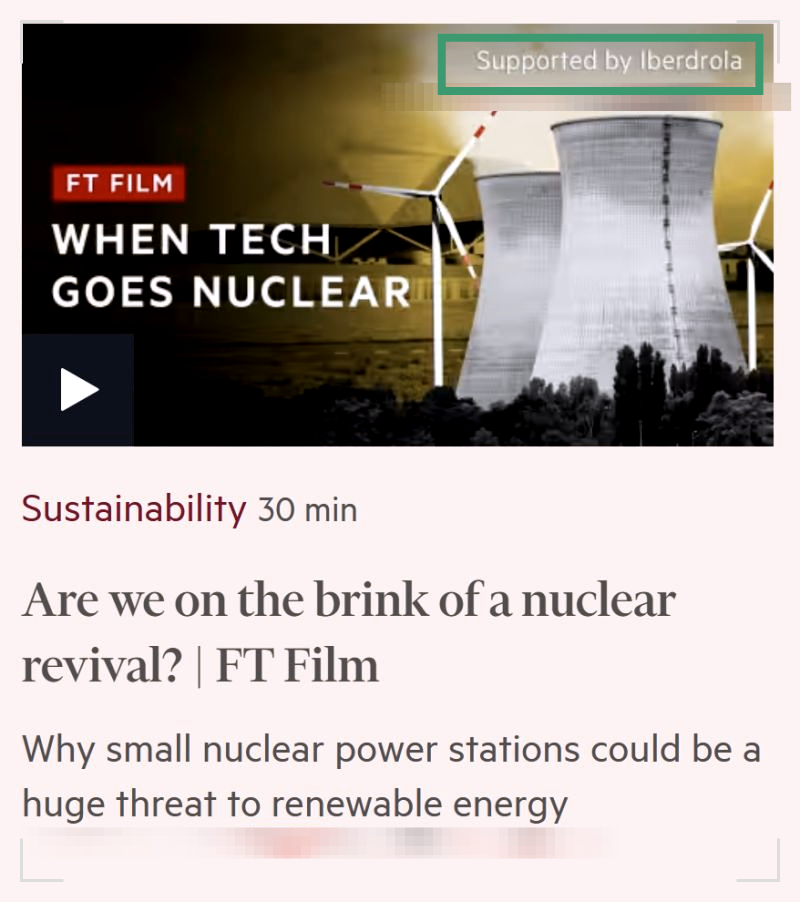Is it surprising? In early April, Spanish renewable energy corporation Iberdrola launched a campaign against nuclear energy, and they’ve chosen the left-leaning Financial Times to do it. A bold PR stunt in the context of a nationwide blackout in Spain last week, likely caused by renewables under-delivering.

Are We on the Brink of a Nuclear Revival?
That's the title of the Iberdrola-Financial Times piece. The Iberian Peninsula blackout served as a shocking reminder that sun and wind alone cannot power our modern economy. Yet Iberdrola has chosen this moment (when trust in renewables is being seriously questioned) to step up their effort to smear nuclear. In a paid promotional piece in the Financial Times, disguised as journalism, they regurgitated the usual talking points: nuclear is too expensive, takes too long, and distracts from the "true path" of wind and solar.
But the facts say otherwise. Nuclear is one of the cleanest and most reliable energy sources available, and unlike renewables, it’s unwavering. When the wind stops blowing or the sun stops shining, guess who saves their neck? Nuclear. It fills in the gaps for when wind and solar underperform. It doesn’t disappear, come rain or shine.
Marco Visscher, journalist and author of The Power of Nuclear, interviewed by the Financial Times, states:
[With nuclear energy] it was the first time that a clean, abundant energy source entered the field. It looks like we haven’t gotten used to the idea that we finally found this abundant energy source … We will need lots and lots and lots more energy to bring global prosperity around the world.
It's not clear that renewable energy companies really care about energy security. They’ve worked hard to mislead us into avoiding nuclear for a long time.
Europe’s current energy woes, aggravated by the Russian invasion of Ukraine, also had to do with Germany’s rash and ill-informed frenzy to shut down every nuclear power plant in the country. Since 2011, after the Fukushima incident, the renewables have lobbied to dismantle the nuclear fleet entirely. Renewables are twisting governments around their finger to push their green ideology to get more and more funding. It’s clear: The German renewables have convinced everyone nuclear is a high-risk technology when it’s not.
Renewables and the Financial Times Are Fearmongering Us
The paper has been teetering on the edge of using anti-nuclear language. Their Iberdrola-sponsored piece is no different to alarmist language that stirs doubts about radiation and safety.
I sometimes think the people who oppose nuclear power are more aware of its potential than those who support it.
Experts in the piece fight tooth and nail to show the facts: that studies of Fukushima and Chernobyl show minimal long-term health effects from nuclear incidents — more so when compared to the very real costs of unreliable energy grids.
But facts don’t matter when fear sells. The article frames nuclear energy not as a complement to renewables, but as a competitor — a drain on climate funding. “Nuclear power stations could be a threat to renewable energy”, reads FT’s title; not a threat against energy sufficiency.
“All of the promises of nuclear power have been broken, smashed to pieces. I don’t understand how it has any credibility at all. I believe we should not be building new nuclear power stations because they make no environmental, economic, or health and safety sense.”
These are the words of Dale Vince, founder of Ecotricity, the self-branded “Britain's Greenest Energy Company.” It’s plain to see: renewable advocates are unapologetically hiding how their technology has failed Spain and how nuclear remains the only reliable, clean power source.
Why Is the Leftist Financial Times Taking Bribes from Renewable Giants?
Besides the blackout and the smear campaign, the real scandal here is the cozy relationship between corporate renewable interests and the legacy media. Iberdrola’s decision to pay for a sponsored piece after a national blackout caused by renewable underperformance reeks of PR damage control. In America, Elon Musk is trying to stop legacy media’s biases, but will Europe follow suit?
Why is the Financial Times, a supposedly impartial media outlet, serving as a platform for renewable lobbyists while subtly demonizing nuclear? Because they earn a few bucks from it. Also, is it time for a nuclear comeback? The evidence says yes. The FT and renewables say no.



![Russell Brand Out on Bail, Faces Rape and Assault Charges in UK Court [WATCH]](/content/images/size/w1304/format/webp/2025/05/russell-brand.jpg)



![They Silenced the Experts: Dr. Drew Blows the Whistle on COVID Cover-Up [WATCH]](/content/images/size/w1304/format/webp/2025/05/covid-leftist-extremism.png)
Conversation